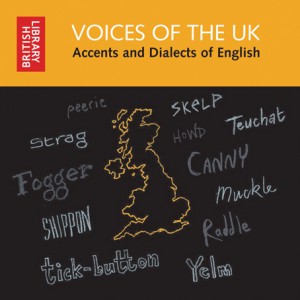Voices in the UK
2010. GB. Audio (CD). British Library. 153 minutes. Price: £ 16.28
 About the Author: Paul Kerswill, Professor of Sociolinguistics, Lancaster University. Currently working on the second of two large ESRC-funded projects on phonetic and grammatical features among teenagers and older people in London, taking account of its massive ethnic diversity.
About the Author: Paul Kerswill, Professor of Sociolinguistics, Lancaster University. Currently working on the second of two large ESRC-funded projects on phonetic and grammatical features among teenagers and older people in London, taking account of its massive ethnic diversity.
E-mail: p.kerswill@lancaster.ac.uk
Today, we are in an age in which we bemoan the loss of old certainties, as social networking topples dictators in an instant and journalists apparently routinely listen in to politicians’ confidences. Our language is swamped by youthspeak, born in the multicultural inner city and causing communication breakdown between the generations. How good it was for me, in these rapidly changing times, to be sent Voices in the UK: Accents and Dialects of English, a two-CD set of English dialects as they once were, rural, local, quaint, and beautiful. An old man from the North Riding (poetic name, this) regrets the coming of technology: ‘They get stuck on these here tractors, you know’. But I digress: here we have a rich compendium of the language of (mainly rural) England, Scotland, Wales and Northern Ireland, through the voices of men (and some women), many born in the last quarter of the nineteenth century, speaking to us in clear, expressive voices about their skills (making cartwheels, stacking corn) and their pastimes (skating in the Fens, riding penny farthings). These CDs are the tip of a vast iceberg of recordings of English dialects made since 1915 (in Germany!) through to the end of the century. Much of the iceberg is now very much in view, the recordings having been digitised and archived. And a lot of it is available through the British Library, but also Leeds and Swansea universities, as well as the BBC.
 What is the value of 143 minute-long snippets of talk, which on the face of it give us just a passing glimpse? The excellent essay by Jonathan Robinson suggests that actors will be able to mine the collection. But Robinson also talks about how the collection provides a ‘meaningfully distributed network of locations and enable[s] comparisons to be made both over time and across geographic space’. So we have a snapshot of that stratum of British society – the rural working class – which is most obviously rooted in both place and time, in a way ‘modern’, urban people simply aren’t. Almost everybody’s English today is much closer to the standard, and this reflects our much more diffuse, even global, life experiences. If nothing else, listening to the recordings tells us this lesson.
What is the value of 143 minute-long snippets of talk, which on the face of it give us just a passing glimpse? The excellent essay by Jonathan Robinson suggests that actors will be able to mine the collection. But Robinson also talks about how the collection provides a ‘meaningfully distributed network of locations and enable[s] comparisons to be made both over time and across geographic space’. So we have a snapshot of that stratum of British society – the rural working class – which is most obviously rooted in both place and time, in a way ‘modern’, urban people simply aren’t. Almost everybody’s English today is much closer to the standard, and this reflects our much more diffuse, even global, life experiences. If nothing else, listening to the recordings tells us this lesson.
 Learning on Screen
Learning on Screen